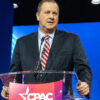Time for practice. Time to pile into the…Toyota Prius? Maybe the Yaris. Or surely the Smart Car will do. Those are three of eleven cars that meet President Obama’s new emissions standards that include “nothing larger than a midsize sedan, even when you include hybrids.”
We’ve pointed out how bad of an idea this is. Megan McCardle summarizes what the new emission standards will do:
• It will raise the prices of cars, and make them less safe
• It will reduce our carbon emissions, but not by as much as advertised, because more fuel efficient cars make driving cheaper, so people will do more of it. This “rebound” effect robs about 25% of gains, and also means more congestion, and more wear-and-tear on roads
• This will either help the Big Three compete, or seal their doom as the Japanese manufacturers continue to eat into their market share. If I had to bet, I’d wager this means big ongoing subsidies for our favorite three public charities.
• If you want to cut down on the pollution from driving, this is about the worst possible way to do it. On the other hand, it may be the only politically feasible way to do it. If you take global warming seriously, as I do, it may be the best of a bad set of policy choices.
And the always insightful Don Boudreaux offers comment:
We Americans are lucky. President Obama, although having zero experience as an entrepreneur or in the automotive industry, has designed fuel-efficiency standards that (he assures us) will save the average car buyer $2,800 over the life of his or her vehicle. What a deal!
No one in Detroit, in the U.K., in Japan, in Germany, in Korea, in Sweden, in Italy, in France – no one anywhere, not even persons with decades of experience producing and selling automobiles – has figured out how to devise vehicles that are so obviously attractive to American consumers — and, therefore, so rich in profit-earning potential for manufacturers — as are the ones now promised to us by the Obama administration.
And we can admire not only Mr. Obama’s industrial and commercial genius, but also his magnanimity in offering to the public, free of charge, his money-saving idea. He could have earned billions of dollars in profit by putting his idea to the test in the market. But no: by simply forcing us to use his idea and charging us nothing for it, he’ll forego this profit. We Americans are lucky indeed.”
Lucky indeed.























